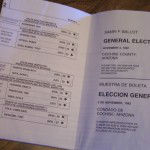Are Voter ID Laws Headed Back to the Supreme Court?

The next term of the Supreme Court begins in a few short weeks and voter ID laws may be one of the first issues on the agenda. The legality of several voter identification laws are being challenged in the federal courts and may be on the fast track to the reach country’s highest court before the November Presidential election.
The Supreme Court last considered the constitutionality of voter ID laws in 2008. In Crawford v. Marion County Election Board, the Court upheld a controversial Indiana voting law requiring photo identification.
The Facts of the Case
The case challenged the constitutionality of an Indiana statute requiring citizens voting in person to present photo identification issued by the government. Under the law, Senate Enrolled Act No. 483, a voter who is indigent or has a religious objection to being photographed may cast a provisional ballot that will be counted only if she executes an appropriate affidavit before the circuit court clerk within 10 days following the election. In addition, a voter who has photo identification but is unable to present that identification on election day may file a provisional ballot that will be counted if she brings her photo identification to the circuit county clerk’s office within 10 days.
Challengers to the law sought to enjoin its enforcement and have it declared invalid. They argued that the voter ID law substantially burdened the right to vote in violation of the Fourteenth Amendment.
The Supreme Court’s Decision
In a sharply divided 6-3 ruling, the Supreme Court ultimately upheld Indiana’s voter ID law. Ultimately, the Court concluded that the law was reasonable because the burden of acquiring, possessing, and showing a free photo identification was not a significant increase over the usual voting burdens, and Indiana’s interests in protecting the integrity of its elections were sufficient to sustain that minimal burden.
Justice Stevens, joined by Chief Justice Roberts and Justice Kennedy, acknowledged that “even rational restrictions on the right to vote are invidious if they are unrelated to voter qualifications,” citing the precedent established in Harper v. Virginia Bd. of Elections. His opinion further notes that a state law’s burden on a political party, an individual voter, or a discrete class of voters must be justified by relevant and legitimate state interests “sufficiently weighty to justify the limitation.”
However, in this case, the justices found the Indiana voter ID law contained “even handed restrictions” protecting the “integrity and reliability of the electoral process itself.” The justices specifically held that deterring and detecting voter fraud and protecting public confidence in elections were both legitimate state interests.
The justices also concluded that the burdens imposed on voters were minimal and justified. Justice Stevens wrote, “Because Indiana’s cards are free, the inconvenience of going to the Bureau of Motor Vehicles, gathering required documents, and posing for a photograph does not qualify as a substantial burden on most voters’ right to vote, or represent a significant increase over the usual burdens of voting.”
Previous Articles
SCOTUS Wraps Up Oral Arguments for the Term
by DONALD SCARINCI on May 17, 2022
The U.S. Supreme Court has concluded its oral arguments for the October 2021 Term. The justices hea...
SCOTUS Rules Censure of Elected Board Member Didn’t Violate First Amendment
by DONALD SCARINCI on May 10, 2022
In Houston Community College System v. Wilson, 595 U.S. ____ (2022), the U.S. Supreme Court held th...
Supreme Court Breach Is Not the First Involving Roe v. Wade
by DONALD SCARINCI on
The recent disclosure of Justice Samuel Alito’s decision purporting to overturn Roe v. Wade is ar...
The Amendments
-
Amendment1
- Establishment ClauseFree Exercise Clause
- Freedom of Speech
- Freedoms of Press
- Freedom of Assembly, and Petitition
-
Amendment2
- The Right to Bear Arms
-
Amendment4
- Unreasonable Searches and Seizures
-
Amendment5
- Due Process
- Eminent Domain
- Rights of Criminal Defendants
Preamble to the Bill of Rights
Congress of the United States begun and held at the City of New-York, on Wednesday the fourth of March, one thousand seven hundred and eighty nine.
THE Conventions of a number of the States, having at the time of their adopting the Constitution, expressed a desire, in order to prevent misconstruction or abuse of its powers, that further declaratory and restrictive clauses should be added: And as extending the ground of public confidence in the Government, will best ensure the beneficent ends of its institution.




